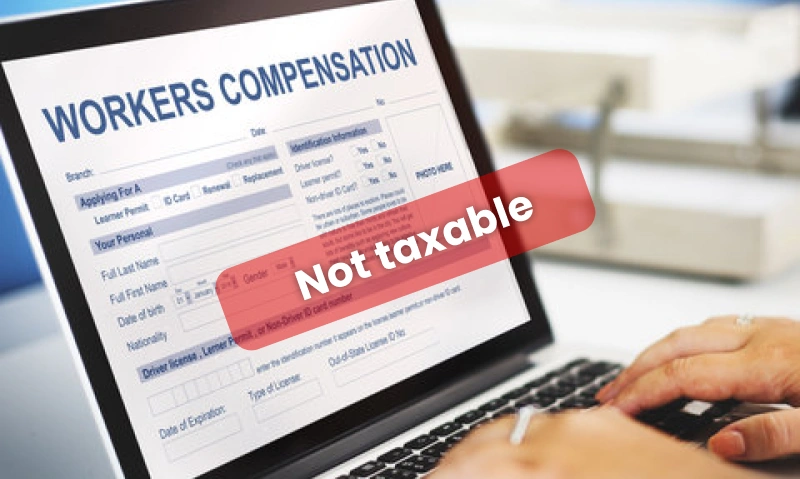Have you ever found yourself staring at your workers compensation cheque and wondering if you’ll need to set some aside for taxes? You’re not alone. This question—is workers comp taxable—is one that crosses the mind of nearly every injured worker at some point.
Today, I’m going to clear the fog around this topic once and for all. The answers might bring you some welcome relief during what’s likely already a stressful time in your life.
Is Workers Compensation Generally Taxable Under Federal Law?
The good news right off the bat is that workers compensation is not taxable income in most circumstances. This is thanks to Section 104(a)(1) of the Internal Revenue Code, which specifically excludes “amounts received under workers’ compensation acts as compensation for personal injuries or sickness” from gross income.
What does this mean in plain English? The money you receive from your workers compensation claim—whether it’s for lost wages, medical treatments, or rehabilitation services—is typically not subject to federal income tax. This exemption applies regardless of whether you receive your benefits as regular payments or as one large settlement.
The rationale for this tax exemption is simple because workers comp benefits are given so that you can recover from your injury or illness sustained in the workplace. They’re intended to substitute what you’ve lost as a result of your injury, it is not intended to give you extra taxable income.
Is Workers Comp Taxable in California and Other States?
“That’s all well and good for federal taxes,” you might be thinking, “but is workers comp taxable in California or my particular state?”
This is a smart question to ask, as state tax laws don’t always mirror federal regulations. Thankfully, in California, workers’ compensation benefits are normally exempt from state taxation under the California Revenue and Taxation Code Section 17131, which incorporates the federal tax exclusions by reference.
Most other states follow similar practices, though there are subtle differences in how each state handles these matters. For example:

The upshot of it all is that in most states, your workers compensation benefits are still tax-free, leaving you one less thing to stress about when you’re recovering.
Future Possibilities of Changes to Tax Law That Would Affect Workers’ Compensation
 While the general rule is that workers comp payments aren’t taxable, some exceptions can muddy the waters. Let’s examine these scenarios where you would have to say “yes” to the question: “are workers comp benefits taxable?”
While the general rule is that workers comp payments aren’t taxable, some exceptions can muddy the waters. Let’s examine these scenarios where you would have to say “yes” to the question: “are workers comp benefits taxable?”
Are You Receiving Both Social Security and Workers Comp?
If you receive both Social Security Disability Insurance (SSDI) or Supplemental Security Income (SSI) and workers compensation, things get a bit complicated. Under the Social Security Act’s “offset” provision (42 U.S.C. § 424a), your Social Security benefits might be reduced if your combined benefits exceed a certain threshold—typically 80% of your average current earnings before you became disabled.
Here’s where taxation comes into play: while your workers comp benefits themselves remain tax-free, they might cause a larger portion of your Social Security benefits to become taxable. This is because the amount of Social Security benefits subject to tax depends on your total income, and in some calculation methods, workers compensation can be considered.
Have You Returned to Work While Still Receiving Benefits?
Most injured workers are eventually able to return to work on a partial basis and continue to receive partial workers compensation benefits. Your earnings from the work you do at this time are taxed as ordinary income, although your workers’ comp benefits are still tax-free.
This creates a hybrid situation where you’re receiving both taxable and non-taxable income, which can lead to confusion during tax season. Under IRS Publication 525, it’s critical to properly distinguish between these different income sources on your tax return.
Does Your Settlement Include Interest or Punitive Damages?
Compensation settlements arising from modern work-related injuries can become quite complex, including several elements besides simple injury compensation. If your settlement contains any of these components, then these components are potentially taxable under some sections of the Internal Revenue Code:
- Interest on your benefits (taxable as interest income under IRC Section 61)
- Punitive damages not related to bodily injury (taxable under IRC Section 104(a)(2))
- Emotional distress damages unrelated to an actual bodily injury (maybe taxable under IRC Section 104(a)(2) restraint)
- Attorney’s fees in some circumstances (may or may not be taxable depending on structuring)
Are You Claiming Medical Expense Deductions?
Suppose you’ve paid for medical expenses out of pocket and later received workers compensation reimbursement for those same expenses. In that case, you cannot also claim those expenses as medical deductions on your tax return. The IRS considers this “double-dipping” and prohibits it under Treasury Regulation § 1.213-1.
How Does the Tax Treatment Differ for Various Types of Workers Comp Benefits?
All workers comp benefits are not the same for tax treatment. Let’s analyze the ways various types of benefits are treated:
What About Temporary Disability Benefits?
Temporary disability benefits—total (TTD) and partial (TPD)—substitute for a percentage of your salary while you recover from your work-related injury. As stated in IRC Section 104(a)(1), these benefits are specifically exempted from gross income and therefore not taxable.
But it’s also important to know that in certain states, such as California under Labor Code Section 4650, these benefits are determined as a percentage of your wages before the injury—usually two-thirds. This cut is partially because it’s assumed that you won’t be taxed on these benefits.
How Are Permanent Disability Benefits Treated?
Permanent disability benefits, whether partial (PPD) or total (PTD), compensate you for lasting impairments from your work injury. These benefits are awarded based on disability ratings and schedules that vary by state.
Under IRC Section 104(a)(1) and related Treasury Regulations § 1.104-1, these benefits also qualify for tax exemption. This holds true regardless of whether you receive them as structured payments or a lump sum settlement.
What About Medical Treatment and Rehabilitation Expenses?
Workers compensation payments for medical treatment, medications, surgeries, and rehabilitation services are not taxable under any circumstances. This exclusion is reinforced by IRS Revenue Ruling 77-230, which clarifies that medical care reimbursements under workers’ compensation acts are excluded from gross income.
How Are Vocational Rehabilitation Benefits Handled?
If your workers comp benefits include vocational rehabilitation—such as job training, education, or placement services to help you return to the workforce—these benefits are generally not taxable. The IRS treats them as extensions of your medical benefits under Treasury Regulation § 1.104-1(b).
What Documentation Should You Keep for Tax Purposes?
 In establishing the tax-exempt nature of your workers compensation payments, good documentation is your best friend. According to IRS record-keeping requirements (detailed in Publication 552), you should have on hand:
In establishing the tax-exempt nature of your workers compensation payments, good documentation is your best friend. According to IRS record-keeping requirements (detailed in Publication 552), you should have on hand:

- Official award letters indicating the nature and intent of your benefits
- All settlement contracts and legal papers pertaining to your case
- Specific records of each payment made, including date, amount, and source
- Medical reports linking your injury to the compensation paid
- Any communication with the workers’ compensation board or insurance company
- Tax returns indicating how you did (or did not) report these benefits in past years
I suggest having a separate filing system for these papers and retaining all of them for a minimum of seven years—the typical IRS audit look-back period under IRC Section 6501.
What Are Some Common Mistakes People Make About Workers Comp and Taxes?
Even with the generally favorable tax treatment of workers compensation, I’ve seen clients make several costly mistakes:
Do People Mistakenly Report Workers Comp as Taxable Income?
Surprisingly, often, yes. Some injured workers mistakenly include their workers’ comp payments on their tax returns, especially if they received a Form 1099 or other tax document that incorrectly categorized these payments. This error can lead to overpayment of taxes.
The solution is to carefully review any tax forms you receive. If a form incorrectly reports your workers’ compensation as taxable, contact the issuer immediately to request a corrected form. If that’s not possible, you may need to file Form 8275 (Disclosure Statement) with your tax return to explain the discrepancy.
Do Some People Miss the Connection to Other Benefits?
Many clients don’t realize how workers compensation can interact with other benefits they’re receiving. For example, under the provisions of IRC Section 86, if you’re receiving both workers’ comp and Social Security retirement benefits, you need to understand how each affects the taxability of the other.
Similarly, if you’re collecting unemployment benefits while receiving certain types of workers comp benefits, there may be both tax implications and potential legal issues depending on your state’s laws. For instance, in some states like New York under Workers’ Compensation Law Section 206, you cannot collect both benefits simultaneously for the same time period.
Are Settlement Structures Overlooked from a Tax Perspective?
One of the biggest mistakes I see is failing to consider tax implications when structuring workers compensation settlements. The way your settlement is allocated among different categories (medical expenses, disability benefits, vocational rehabilitation, etc.) can have significant tax consequences.
Under IRS Revenue Procedure 2003-43, it’s crucial that settlement documents clearly specify the nature of each payment to ensure proper tax treatment. Working with an attorney who understands both workers’ compensation and tax law can help you optimize your settlement structure.
Here’s Something You Can Learn From Our Workers Comp Tax Case!
Let me share a revealing case study that might answer your question about whether is workers comp taxable in Los Angeles, California specifically.
Last year, Maria, a restaurant owner from downtown suffered a severe back injury when a shelving unit collapsed on her while at work. As a workers’ comp lawyer, we later represented her while tax returns.
When tax time came around, Maria heard contradictory recommendations from her well-intentioned friends. Some advised her to include her benefits as income on both state and federal tax returns, while others said they were exempt from taxes. To further complicate matters, her benefits document included no taxation information.
Maria’s case points to the need to know local applications of tax law. According to both California’s Revenue and Taxation Code Section 17131 and Los Angeles Municipal Code tax laws, her workers compensation benefits were completely tax-exempt.
But her case was slightly complicated because she had also earned interest on a late payment. While her core benefits remained tax-free, that interest portion—approximately $350—was indeed subject to taxation under both California and federal law.
The crucial lesson from Maria’s case is that while workers comp payments themselves aren’t taxable in Los Angeles, ancillary components might be. This distinction saved Maria from unnecessarily paying taxes on her entire benefit amount, which would have cost her thousands in overpaid taxes.
How Can Our Law Firm Help You Navigate These Complex Waters?
Understanding whether “is workers compensation taxable income” in your specific situation requires more than just general knowledge. It demands a nuanced understanding of both workers’ compensation law and tax regulations—and how they interact in your unique circumstances.
Contact workers comp attorney as our legal firm-The Law Office of Joseph Pluta, specializes in precisely this intersection. We can:
- Review your current benefits and advise on their tax implications
- Structure settlements to optimize tax treatment
- Coordinate with your tax professional to ensure proper reporting
- Represent you in disputes with taxing authorities if your benefits are incorrectly classified
- Help you plan for long-term financial security, considering both current and future tax laws
Don’t leave money on the table or risk tax problems down the road. The right legal guidance can make all the difference between unnecessary tax burdens and receiving the full benefits you’re entitled to by law.
Schedule your free consultation now 
Frequently Asked Questions
Do you have to pay taxes on workers compensation for medical expenses?
No. Benefits paid specifically for medical expenses related to work injuries are not taxable under IRC Section 104(a)(1).
Are workers comp payments taxable if I receive them as a lump sum?
Generally not. The method of payment doesn’t typically change the tax status of legitimate workers’ compensation benefits, as clarified in IRS Revenue Ruling 85-97.
Does claiming workers comp affect my tax bracket for other income?
No. Your workers compensation benefits don’t count toward your total taxable income, so they won’t push you into a higher tax bracket. Your tax rates will be calculated based only on your taxable income sources, as confirmed by IRS Notice 2020-76.
What if my employer reported my workers comp incorrectly on my W-2?
This happens more often than you might think. If your workers comp payments appear on your W-2, contact your employer immediately to request a corrected form. You shouldn’t pay taxes on these benefits. If they can’t resolve it quickly, you may need to file Form 843 with the IRS to claim a refund of incorrectly paid taxes.
Are attorney fees for workers compensation cases tax-deductible?
Generally, no. Since workers compensation is not taxable income, related attorney fees aren’t tax-deductible under current tax law. This follows the principle established in IRC Section 265 that expenses related to generating tax-exempt income aren’t deductible. However, if your case involves other taxable components, a portion of your legal fees might be deductible.








